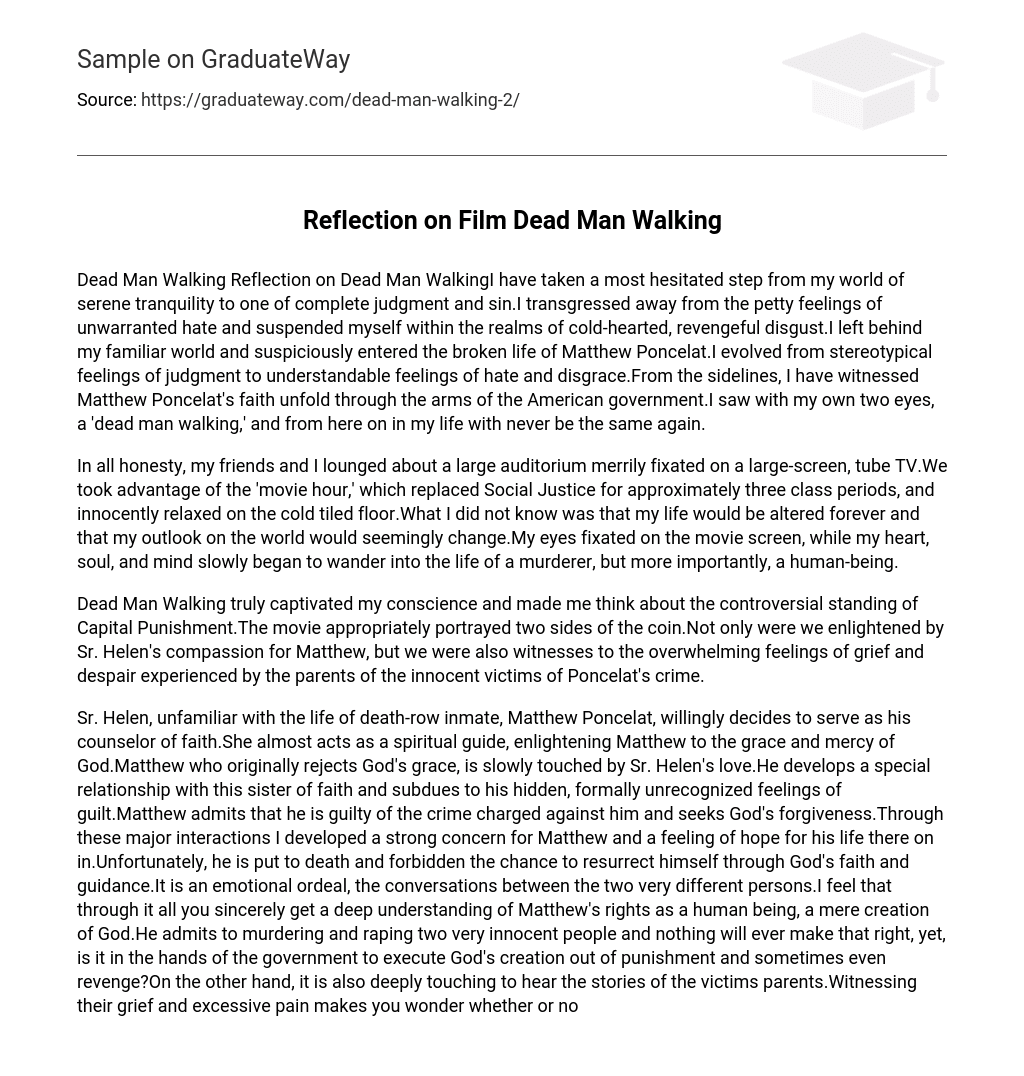I have ventured away from my peaceful existence to explore a realm of criticism and misconduct. I have renounced petty enmity and embraced fervent, vengeful detestation. I have forsaken the familiar and entered Matthew Poncelat’s shattered reality. My perspective has shifted from superficial evaluation to genuine emotions of loathing and shame. I have personally witnessed how the American government is taking advantage of Matthew Poncelat’s faith. I have directly observed a man confronting condemnation, an encounter that will forever change my life.
While attending a movie hour in a spacious auditorium, my companions and I joyfully observed a film on a tube TV. It was a pleasant respite from our Social Justice class as we comfortably reclined on the chilly tiled floor. Unbeknownst to me, this particular experience would leave an enduring mark on my existence and transform my perspective of the world. As I closely followed the movie’s plot, my concentration shifted towards the tale of a killer, prompting contemplation on their inherent humanity.
Dead Man Walking profoundly engaged my conscience and prompted contemplation of the controversial nature of Capital Punishment. The film effectively presented both perspectives. Sr. Helen’s empathy for Matthew enlightened us, while also showcasing the immense sorrow and hopelessness felt by the parents of Poncelat’s innocent victims.
In an act of willingness, Sr. Helen takes on the role of Matthew Poncelat’s faith counselor, despite her lack of familiarity with his life as a death-row inmate. As a spiritual guide, she enlightens Matthew about God’s grace and mercy. Initially rejecting this grace, Matthew gradually becomes touched by Sr. Helen’s love and forms a deep connection with her as a fellow believer. He confronts his previously unrecognized feelings of guilt and admits to the crime he is charged with, seeking forgiveness from God. Through these significant interactions, my concern for Matthew grows stronger and I feel hopeful about the future trajectory of his life.
Unfortunately, he is executed and denied the opportunity to be reborn with God’s faith and guidance. The interactions between these two individuals are emotionally challenging. Throughout it all, one truly gains a thorough understanding of Matthew’s rights as a mere creation of God. He acknowledges his heinous acts of murdering and raping two innocent individuals, and there is nothing that can ever make that right. However, should it be up to the government to execute God’s creation as a form of punishment, and sometimes even revenge? On the other hand, it is also deeply moving to hear the accounts of the parents of the victims. Witnessing their sorrow and immense pain prompts the question of whether Matthew deserves to live or not. He not only took the lives of two innocent young people, but he also robbed four proud parents of their happiness and pride.
Matthew’s heinous act has led the parents of his victims to utterly reject any possibility of a future for him. They are actively calling for his swift execution. Empathizing with these parents is nearly impossible, as they endure indescribable suffering each day.
The Poncelat family consists of Matthew, his mother, brothers, and daughter. Matthew’s life began as a pure creation of God when he was born as an innocent baby. Unfortunately, he made a grave error and feels immense remorse for his actions. According to Catholic Church doctrine, any sin can be absolved through genuine regret and acts of penance. God’s love and mercy are everlasting, extending forgiveness generously even to those who have committed serious transgressions but sincerely seek redemption.
The impact of the film on me was mainly because of Sr. Helen, who is a unique figure demonstrating both genuine compassion and her own humanity. Often, religious figures such as leaders, priests, and nuns may appear unapproachable or saintly, seeming superior to others. However, Sr. Helen not only preaches about God’s love but also embodies it as a true follower of God. She represents the emotions that people commonly experience in their everyday lives and finds herself torn between her love for Matthew and her love for the families of the innocent victims. As she shows us, she seizes the opportunity to do good while on Earth. Despite the couple she helps already being in heaven with God, she still does what she can by nurturing love in Matthew and helping him acknowledge his guilt. Eventually, he understands that all aspects of creation are sacred – including his own life.
At first, Matthew seems emotionally distant and incapable of experiencing God’s love. However, his interactions with Sr. Helen assist him in surpassing society’s expectations of emotional detachment. Eventually, he succumbs to overwhelming feelings of guilt and sorrow, enabling God’s love to radiate within him. Without a doubt, this profound change greatly impacted my perspective on Capital Punishment.
It is my belief that society needs to find a more compassionate approach towards addressing the issue of death row. It is morally wrong to seek retribution through capital punishment, regardless of whether the individual expresses remorse for their actions. As human beings, we should not possess the authority to intentionally end the life of a being created by God, irrespective of the gravity of their offense. While it may be challenging to empathize with God’s perspective when someone dear to us becomes a victim of a serious crime, it is essential to consider all ramifications. Depriving an individual – who is also part of God’s creation – can inflict even greater emotional devastation than immediate execution itself. Instead of resorting to instant death, subjecting offenders to perpetual suffering would be more appropriate. Being inherently human, every criminal must harbor some degree of regret and sorrow within them, albeit not always outwardly apparent.
Despite being against God’s will for creation, I strongly oppose the inhumane act of the death penalty. It is crucial to actively explore alternative forms of punishment as we, as humans, do not possess the authority to end a person’s life.





